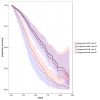Mortality in dementia with Lewy bodies compared with Alzheimer's dementia: a retrospective naturalistic cohort study
- PMID: 29101136
- PMCID: PMC5695389
- DOI: 10.1136/bmjopen-2017-017504
Mortality in dementia with Lewy bodies compared with Alzheimer's dementia: a retrospective naturalistic cohort study
Abstract
Objectives: To use routine clinical data to investigate survival in dementia with Lewy bodies (DLB) compared with Alzheimer's dementia (AD). DLB is the second most common dementia subtype after AD, accounting for around 7% of dementia diagnoses in secondary care, though studies suggest that it is underdiagnosed by up to 50%. Most previous studies of DLB have been based on select research cohorts, so little is known about the outcome of the disease in routine healthcare settings.
Setting: Cambridgeshire & Peterborough NHS Foundation Trust, a mental health trust providing secondary mental health care in England.
Sample: 251 DLB and 222 AD identified from an anonymised database derived from electronic clinical case records across an 8-year period (2005-2012), with mortality data updated to May 2015.
Results: Raw (uncorrected) median survival was 3.72 years for DLB (95% CI 3.33 to 4.14) and 6.95 years for AD (95% CI 5.78 to 8.12). Controlling for age at diagnosis, comorbidity and antipsychotic prescribing the model predicted median survival for DLB was 3.3 years (95% CI 2.88 to 3.83) for males and 4.0 years (95% CI 3.55 to 5.00) for females, while median survival for AD was 6.7 years (95% CI 5.27 to 8.51) for males and 7.0 years (95% CI 5.92 to 8.73) for females.
Conclusion: Survival from first presentation with cognitive impairment was markedly shorter in DLB compared with AD, independent of age, sex, physical comorbidity or antipsychotic prescribing. This finding, in one of the largest clinical cohorts of DLB cases assembled to date, adds to existing evidence for poorer survival for DLB versus AD. There is an urgent need for further research to understand possible mechanisms accounting for this finding.
Keywords: dementia; health informatics; old age psychiatry.
© Article author(s) (or their employer(s) unless otherwise stated in the text of the article) 2017. All rights reserved. No commercial use is permitted unless otherwise expressly granted.
Conflict of interest statement
Competing interests: None declared.
Figures
References
Publication types
MeSH terms
LinkOut - more resources
Full Text Sources
Other Literature Sources
Medical

